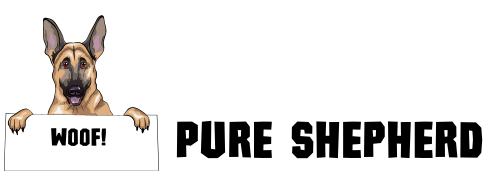If you own a German Shepherd, then you know all too well about your dog’s insatiable appetite for pleasing you, but also food!
These dogs have a sense of smell that is keen, love to work and play, and will do so for extended periods of time without losing focus. In fact, this is one of the reasons why they are they are the dog of choice for search & rescue teams and law enforcement agencies. With that said, they deserve proper feeding, and given the choice no owner would willingly feed them low-quality dog foods.
What you feed your German Shepherd plays an important role in their growth, health and general overall well-being. For this reason, you should pay attention to their diet. When fully grown your dog can weigh anything between 70 and 100 pounds. This growth can be achieved with a well-balanced diet including a healthy blend of proteins, fats, vitamins, minerals, and carbohydrates.
Some GSD owners may believe that any type of dog food available in the store or online is good for their dogs, and feed them with without considering the nutrient content. This can be a mistake as not all dog foods are equal and some may not actually be so great for the health of your dog.
How many calories does a German Shepherd need?
German Shepherds have large muscular bodies. On top of that, they have strong and active metabolism. To satisfy their healthy appetite, these dogs need to be fed a nutrient-rich and quality dog food.
The food should be rich in calories in order for to maintain a healthy body weight. The National Research Council of the National Academies suggests that the right amount of calories for dogs within the 60 to 90 pound range is:
- Inactive or older dogs: between 1,272 and 1550 calories per day
- Active dogs: between 1740 and 2,100 calories per day
To ensure you puppy has sufficient energy for their growth and development they will need between two and three times the number of calories of an adult dog. Consult your vet for the best guidance.
Feeding your Germany Shepherd Puppy
As mentioned, your puppy’s calorie or food requirement will vary on their ages and body weight as they develop and grow. Each puppy will be different and you should take the advice of the breeder and / or your vet.

From birth of course the ideal scenario is for your newborn puppy to feed from their mother. You can begin transitioning them to regular puppy food at around 4 weeks old. This is called weaning and also allows the mother’s milk to dry up.
When you introduce dry food you might want to make it easier for them to eat by mixing it with a little water, or use puppy milk replacer. Make it moist and mushy or even a little like soup, gradually making it drier as you progress. Normally by the time they are 7 weeks old they will be eating their dry or puppy food only.
Puppies are normally with their mother until they are 8 to 10 weeks old so if you’re brining a puppy home from a breeder we suggest you keep to their brand or type of food and introduce your own choice gradually so your new puppy can get accustomed to it.
Age
- 2 – 3 months
- 3-4 months
- 4-5 months
- 5-6 months
Weight
- between 11 and 30 pounds
- between 17 and 40 pounds
- between 31 and 49 pounds
- between 35 and 57 pounds
Your dog will reach maturity somewhere between 18 and 24 months, though it is said that some Eastern European line will mature at a slower rate and this might not be until they are 36 months old.
What can I feed my German Shepherd to gain weight?
If you dog is under-weight for any reason then feeding them with an overall high calorific value will help them gain weight. You could substitute half of their normal food with a puppy food which is typically higher in calories. You must talk with your vet first, especially to make sure that the added protein that is often found in puppy food is safe for your older dog. You might also discuss why your dog is under-weight since there could be an underlying health problem that needs addressing.
Don’t be tempted to over feed you dog – extra weight and aggravate conditions such heart issues and the dreaded hip dysplasia that is common in German Shepherds.
Dog Food Breakdown – What should I feed my dog?
You’ll be aware that that not all dog foods contain the same nutrient content, and when you compare different foods and their ingredients lists, you will realize that their ratios of carbohydrates, proteins, and fats differ greatly.
As mentioned earlier, GSDs have different caloric needs and higher energy levels when compared most other dog breeds. This means that when it comes to food, you should be very careful what you feed them.
According to guidelines set by The Association of American Feed Control Officials (AAFCO), German Shepherds and other large breed dogs should be fed organic dog food containing between thirty to forty percent protein. The protein should also be of high quality, that is, with a minimum of 22%. AAFCO stresses that the protein should not be from meat that is not fit for human consumption, low quality meat from grocery stores, or animal by-products, but from actual meat based sources.
Carbohydrates, Fats, And Proteins
The AAFCO also recommends that your GSD’s diet should contain high-quality animal-based fats. The quality of the fat should not be less than 15% and more than 30%. The importance of fat in your dog’s diet is to provide the fatty acids necessary for smooth digestion, lubricates its internal systems, and helps it develop healthy bones and joints.

Your dog’s diet should also contain carbohydrates. For GSDs, the carbohydrate content in their diet should be between 5% and a 8%.
Most dog owners not feeding a blended food will ask how to provide the carbohydrates in their dog’s food. Recommendation of carbohydrate sources include oats, rice, barley, and sweet potatoes. These sources are great for dogs because they contain micronutrients that can supplement your GSD’s diet and are also easy to digest.
Take the time when buying dog food and always read through the list of contents to see what it contains. Some manufacturers of dog food use corn, wheat based products, and soy, which are proven to be the leading factor in most food allergies and can also cause digestion problems.
Vitamins and Minerals
As much as carbohydrates, fat, and protein are crucial, vitamins and minerals to play an important role in your dog’s diet.
If you are feeding your GSD fresh dog food, its diet should also contain vitamins and minerals. These nutrients help in preventing many health conditions and promote well-being in your dog. They help build up its immunity, and maintain that beautiful coat.
The best recommended source of minerals and vitamins for dogs are real vegetables and fruit (avoiding the pips) and legumes such as lentils.
Just like your own plates and glasses remember to wash your dog’s feed and water bowls regularly with soap and hot water
Normal foods that German Shepherds love that you can feed
Eggs – either cooked or raw
Lean meats – such as chicken, turkey, pork
Vegetables – such as beans, carrots, sweet potato
Watermelon – cool from the fridge – what a lovely treat on a hot day – your dog will be drooling
Other fruit such as pear and apples are fine – just try to avoid the pips so they don’t upset your dog.
Consider cooking items such as eggs and chicken to avoid salmonella.
What about dairy for dogs?
On the whole dogs are lactose intolerant so avoid giving your dog too much dairy – this includes milk, ice cream and cheese. As with humans who are intolerant it may cause diarrhoea and / or a sore tummy.

Are marrow bones safe for dogs?
Whilst your dog will mostly likely love to chomp down on a bone and take hours to lick out the marrow most vets agree that giving bones to dogs is not a great idea, not only can they cause obstructions and tears in the digestive system they can cause teeth to fracture. They are popular with those that feed a raw food diet and do provide a good source of vitamins and minerals, but you have to make the decision on whether to feed them or not.
What about chicken bones?
are likely to splinter so we don’t recommend you ever give them to your dog. They can cause damage and be an obstruction through the whole digestive tract. Take a little time to pick off all the little left over bits of meat – they will really enjoy that.
Foods your shouldn’t feed your dog, and ingredients in dog food to avoid
There are a number of foods that are toxic or unhealthy for your dog and you should avoid feeding them. These can include:
- Chocolate, coffee and caffeine items are very bad for your dog – they can be highly toxic due to the methylxanthines contained within them. Avoid these foods.
- Grapes and raisins are said to be toxic to dogs causing kidney failure.
- Aside from their high fat value macadamia and walnuts also contain toxins which may cause issues for dogs
Also avoid high fat foods – no sneaking a piece of bacon! Aside from a diet in fatty food leading to weight gain it can also lead to pancreatitis. As with human’s weight gain can lead to increased joint problems and make conditions such as arthritis worse – especially in older dogs.
Dog Food Ingredients To Avoid
When shopping for your dog’s food, make sure you read the label and see which ingredients are contained. Remember the ingredients are listed in order of size so the first ingredient is the biggest.
We suggest you avoid these the ingredients as they can cause allergies and exacerbate other health conditions dogs suffer from.
- Wheat based products
- Proteins not fit for animal innards or human consumption, and animal by-products
- Bone meal made from animal bones that are finely crushed. This tends to be hard for dogs to digest
- Soy based products or corn syrup
- Artificial flavours, coloring and preservatives
If you notice your German Shepherd not wanting to eat, losing hair, having digestive issues, or constantly scratching you might want to look at their diet and food – check the ingredients and see if you think that could be causing the issue.
You may wish to try a reputable hypoallergenic dog food.
Feeding problems caused by poor diet your dog might experience
Though most German Shepherds have a healthy appetite, their digestive systems can also be fragile, and dependent upon what issues your dog has you may need to adjust their diet by adding supplements or eliminating certain kinds of food, feeding a hypo allergenic and or raw food diet.
Some conditions that might be caused by poor diet can include:
Poor Nutrient Absorption
When compared to other dog breeds and even those that are smaller in size, GSDs have the shortest colons. This means that it is tougher for these dogs to properly absorb nutrients from the food they’ve eaten. To help them, you need to feed them fresh dog food recipes of high-quality fibre from sources such as fruits, barley, and oats.
Diarrhoea
Typically caused by either a food intolerance or a parasite. If you have eliminated the presence of a parasite by your vet then look at their diet. Perhaps it’s just a short term / once off issue you can identify but otherwise it may be trial and error to find out which foods your dog can tolerate. Consider also, other behavioural factors such as overeating anxiety both of which can lead to diarrhea in dogs.
Ulcers
German Shepherd’s sensitive stomachs can make them vulnerable to ulcers, a sore and break in the in the lining of the stomach. Ulcers will result in pain for your dog and symptoms can include bloody stools, anaemia, weight loss, vomiting and overall loss of appetite and interest in their food.
Gastric Bloat
Common in deep-chested dogs like German Shepherds this condition is caused by liquids, food, and gas filling your dog’s stomach. As a result, your dog’s stomach starts to swell, causing it a lot of pain. If left untreated it may result in death.
This problem can be prevented by feeding your dog smaller meals each day, twice if you normally feed once a day or whatever suits your routine, and avoiding overfeeding it. Also, you should avoid exercising your dog immediately after eating and reduce the amount of water it drinks just after eating.
Pancreatic Issues
EPI or Exocrine Pancreatic Insufficiency is a condition when your dog’s pancreas doesn’t produce enough digestive enzymes leading to an inability to break down the various components in their food such as protein, fat and carbohydrates. Once again, if your dog loses weight even though it is eating well, poops a lot and has flatulence then we suggest you have your vet check with a blood test. Treatment includes antibiotics, supplements and a specialized diet.
And finally….
Fresh water is essential for your dog
In addition to feeding your GSD a healthy balance of nutrients, you should also ensure a constant supply of fresh and clean drinking water is always available. Remember to always have some in the car or on any kind of journey to prevent overheating.
Do not forget to clean the water bowl regularly to prevent any germ build up.

Please discuss your dog’s diet with your vet to ensure the best care for your GSD.




